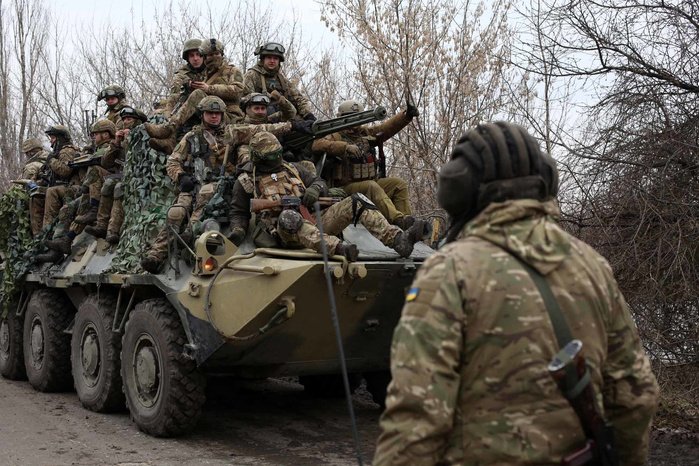The extraordinary session of the Foreign Affairs Council on Friday afternoon called for a humanitarian corridor and highlighted the need to further support EU frontline member states hosting the majority of those fleeing the war in Ukraine.
The meeting was attended by US Secretary of State, Antony Blinken, by NATO Secretary General, Jens Stoltenberg, by the UK Foreign Secretary, Elizabeth Truss, and by the Canadian Foreign Minister, Mélanie Joly. Ukrainian Foreign Minister Dmytro Kuleba was connected remotely from the beleaguered capital, Kyiv.
The most important issue was how to stop the war which has becoming increasingly brutal, with indiscriminate Russian shelling of Ukrainian cities and civilian infrastructure, and risks resulting in a humanitarian disaster. Russia is slowly advancing and has not yet unleashed its full might.
Compared with other places distant from Europe, like in the war in Chechnya and Syria, where Russia launched aerial bombings against civilian targets, it has acted with relative restraint until now but this can change. Without effective international invention to achieve a cease-fire, a large-scale bloodbath can be expected,” wrote Amos Harel, a military correspondent in Israeli daily Haaretz.
“Before things get better, they are going to get a lot worse,” he warned on Friday.
“They are shelling residential housing, schools, hospitals, and other civilian infrastructure,” said Josep Borrell, EU’s High Representative for Foreign Affairs and Security Policy at the following press conference. “It looks like they want to destroy Ukraine.”
He recalled that the UN Human Rights Council voted on Friday on the urgent establishment of a commission of inquiry to address these violations of human rights and international humanitarian law.
“Russia must cease its military operations immediately, and unconditionally withdraw from the entire territory of Ukraine. The same goes for Belarus, who is a full accomplice to Moscow.”
Referring to he Russian attacks in the direct vicinity of an Ukrainia nuclear power plant – the biggest Ukrainian power plant has been attacked - he underlined that the Russian army must respect emergency safe zones around nuclear sites. “We need to ensure the safety of these zones because the safety of the entire European continent can be affected.”
US foreign secretary Blinken described the cooperation between the EU and the US as a historic moment which has reinforced the Euro-Atlantic partnership. Together, the US and the EU have led the way of imposing the most far-reaching sanctions packages ever adopted. “We must now ensure that they are fully implemented – because it is not enough to announce, to agree.”
Are the sanctions that have been adopted until now enough to stop the war?
According to Borrell, the sanctions are already producing results. The aim is not to harm the Russian people, but to pull the rock out from under the Kremlin’s war machine. But it is Putin’s war, he said. “And only Putin can end it.”
In particular, he highlighted the sanctions against the Russian oligarchs - many of them belonging to the inner circle of the Russian president - whose assets abroad are being seized. Besides turning off the tap of money flows financing the war, their assets could be needed to rebuild Ukraine after the war. But that Borrell did not mention.
While no new sanctions were adopted at the Council meeting, EU has not exhausted its arsenal of sanctions. Borrell warned that there will be more sanctions. EU will probably increase the number of Russian banks to be switched off from the SWIFT. There was also a “brainstorming” on ending the import of Russian natural gas which current accounts for 40 % of total gas imports to the EU.
“We cannot cancel it overnight, but we must reduce it now, by implementing all the means we have to do so,” he said.
Is there a feasible political solution to stop the war?
“We're not going to ask President Zelensky to leave Kyiv,” Borrell assured. “We're not going to ask Zelensky not to fight. We are doing what we can and we can do a lot, but obviously if someone is waiting for the financial sanctions to stop the war tomorrow, they don't know what they are talking about.”
“Unfortunately, we do not have the capacity to stop the war tomorrow. But we have the capacity to weaken the Russian economy, and a lot. Of course, that will take time.”
“Will votes at the United Nations stop the war? No, unfortunately not,” Borrell admitted. “We don't have a voting mechanism to say 'the war ends tomorrow because there is a majority in the United Nations'. International isolation and economic weakening have consequences, consequences that, unfortunately, will not be immediate. But that's what we have to do, and that's what we can do.”
In the meantime, a humanitarian tragedy is unfolding, with the Russian army continuing its bombardments, encircling and occupying Ukrainian cities.
The Russian president outlined last week his terms for a cease-fire. Russia demands that Ukraine recognize the two breakaway regions and its annexation of Crimea. Ukraine must also commit never to acquire nuclear weapons – a commitment it made already when it became independent after the dissolution of former Soviet Union.
In addition, if Ukraine remains a “friendly country” to the West, it must become demilitarized and “neutral”. The last condition is similar to Finland’s status during the cold war. Can Ukraine remain an independent and democratic country and enter the EU while accepting the Russian conditions for a cease-fire and political solution?
M. Apelblat
The Brussels Times

